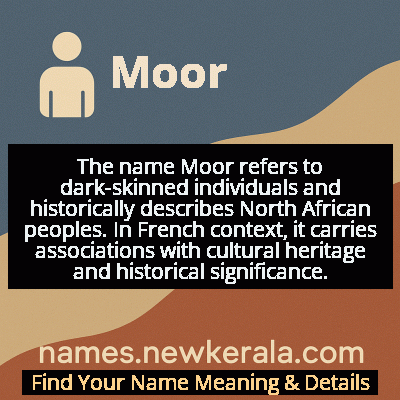Moor Name Meaning & Details
Origin, Popularity, Numerology Analysis & Name Meaning of Moor
Discover the origin, meaning, and cultural significance of the name MOOR. Delve into its historical roots and explore the lasting impact it has had on communities and traditions.
Name
Moor
Gender
Male
Origin
French
Lucky Number
7
Meaning of the Name - Moor
The name Moor refers to dark-skinned individuals and historically describes North African peoples. In French context, it carries associations with cultural heritage and historical significance.
Moor - Complete Numerology Analysis
Your Numerology Number
Based on Pythagorean Numerology System
Ruling Planet
Neptune (Ketu)
Positive Nature
Intuitive, analytical, spiritual, and inquisitive.
Negative Traits
Secretive, reserved, aloof, and can be overly critical.
Lucky Colours
Green, yellow.
Lucky Days
Monday.
Lucky Stones
Cat’s eye, moonstone.
Harmony Numbers
1, 5, 6.
Best Suited Professions
Scientists, researchers, spiritual leaders, detectives.
What People Like About You
Depth of knowledge, analytical skills, spirituality.
Famous People Named Moor
Moor of Venice
Literary Character
Protagonist of Shakespeare's tragedy Othello
Abd al-Rahman I
Umayyad Emir
Founded the Emirate of Córdoba in Al-Andalus
Yusuf ibn Tashfin
Almoravid Ruler
Expanded Moorish territory in North Africa and Iberia
Moor Mother
Musician/Artist
Experimental musician exploring African diaspora experiences
Name Variations & International Equivalents
Click on blue names to explore their detailed meanings. Gray names with will be available soon.
Cultural & Historical Significance
In Shakespeare's 'Othello,' the Moor of Venice became one of literature's most complex racial representations, embodying both noble qualities and tragic flaws. The name's cultural weight reflects centuries of cross-Mediterranean exchange, conflict, and cultural fusion. While historically used as an ethnic descriptor, the name Moor has been reclaimed in modern times by artists and thinkers exploring African diaspora identity, transforming what was once an external label into a symbol of cultural pride and historical consciousness.
Extended Personality Analysis
Individuals named Moor are often perceived as possessing a commanding presence and natural authority, reflecting the historical association with military leaders and rulers. They tend to exhibit strong determination, resilience, and the ability to navigate complex cultural environments, much like the historical Moors who established civilizations in foreign lands. There's often an air of mystery and depth to their character, combined with intellectual curiosity and appreciation for knowledge and the arts.
Their personality typically blends strategic thinking with emotional intensity, capable of both calculated decision-making and passionate commitment. They often demonstrate cultural adaptability while maintaining strong personal identity, showing grace under pressure and the ability to bridge different worlds. The name suggests someone who carries themselves with dignity and possesses an innate understanding of power dynamics, yet remains deeply connected to their roots and heritage.
Modern Usage & Popularity
In contemporary usage, Moor remains an uncommon but meaningful given name, often chosen by parents seeking to honor North African heritage or make a statement about cultural identity. The name has seen a slight resurgence among intellectuals and artists interested in exploring diaspora narratives and reclaiming historical terminology. While not appearing on mainstream baby name charts, it carries significant weight in academic and artistic circles, particularly among those engaged with post-colonial studies and African diaspora culture. Modern usage often emphasizes the name's historical grandeur and cross-cultural significance rather than its purely descriptive origins.
Symbolic & Spiritual Meanings
Symbolically, Moor represents cultural bridge-building, resilience, and the complexity of identity across boundaries. It evokes the meeting of civilizations, the exchange of knowledge between Europe and Africa, and the enduring power of cultural heritage. The name carries connotations of strength forged through adversity, intellectual sophistication, and the ability to maintain dignity in the face of misunderstanding or prejudice. Metaphorically, it suggests someone who embodies historical depth while navigating contemporary realities, serving as a living connection between past and present, tradition and innovation.

